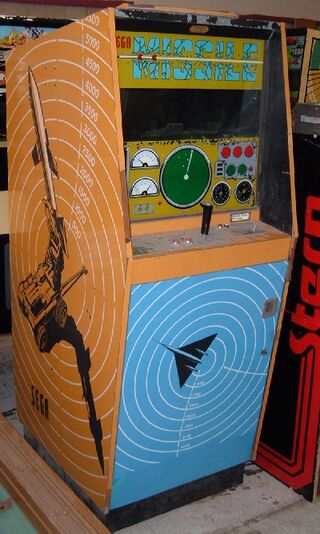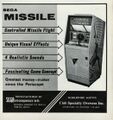Difference between revisions of "Missile"
From Sega Retro
| Line 17: | Line 17: | ||
It was an early shooter and vehicle combat simulation game. It was also the earliest known arcade game to feature a joystick with a fire button, used as part of an early dual-control scheme. It uses a similar projection display system as ''[[Duck Hunt]]'', ''[[Grand Prix]]'', ''[[Jet Rocket]]'' and ''[[Killer Shark]]''. | It was an early shooter and vehicle combat simulation game. It was also the earliest known arcade game to feature a joystick with a fire button, used as part of an early dual-control scheme. It uses a similar projection display system as ''[[Duck Hunt]]'', ''[[Grand Prix]]'', ''[[Jet Rocket]]'' and ''[[Killer Shark]]''. | ||
| + | |||
| + | In 1970, the game was licensed to Midway, which released a version of the game as ''S.A.M.I.'' in North America. | ||
==Specifications== | ==Specifications== | ||
Revision as of 18:05, 16 March 2016
| Missile | |||||
|---|---|---|---|---|---|
| System(s): Electro-Mechanical | |||||
| Publisher: Sega | |||||
| Developer: Sega | |||||
| Number of players: 1 | |||||
|
Missile is a 1969 electro-mechanical arcade shooter game by Sega that launches rockets with a joystick control.
The game has electronic sound, and the fired missile can be steered by the player after it is launched by using the joystick. The cabinet is covered in a Formica-like material and is very durable (and heavy). Missile uses a looping film strip to show the planes on a projection screen. The player moves a small motorized tank left and right via two buttons (left and right) which moves the motorized launcher, and then fires ahead of the incoming missiles. Once the missile is launched, the missile can be slightly steered into the oncoming planes ("flight control") by moving the joystick left or right. If a plane is hit, an explosion is heard and an explosion flashes on the projection screen.
The cabinet was specifically designed for 25-cent play in the United States.
It was an early shooter and vehicle combat simulation game. It was also the earliest known arcade game to feature a joystick with a fire button, used as part of an early dual-control scheme. It uses a similar projection display system as Duck Hunt, Grand Prix, Jet Rocket and Killer Shark.
In 1970, the game was licensed to Midway, which released a version of the game as S.A.M.I. in North America.
Specifications
- Height: 69"
- Width: 26"
- Depth: 36"







